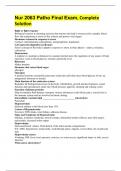Exam (elaborations)
Nur 2063 Patho Final Exam, Complete Solution
- Course
- Institution
Nur 2063 Patho Final Exam, Complete Solution flight or fight response Biological reaction to alarming stressors that musters the body's resources (for example, blood flow and respiration) to resist or flee a threat and protect vital organs Hormones released in response to stress Cortisol, cat...
[Show more]



